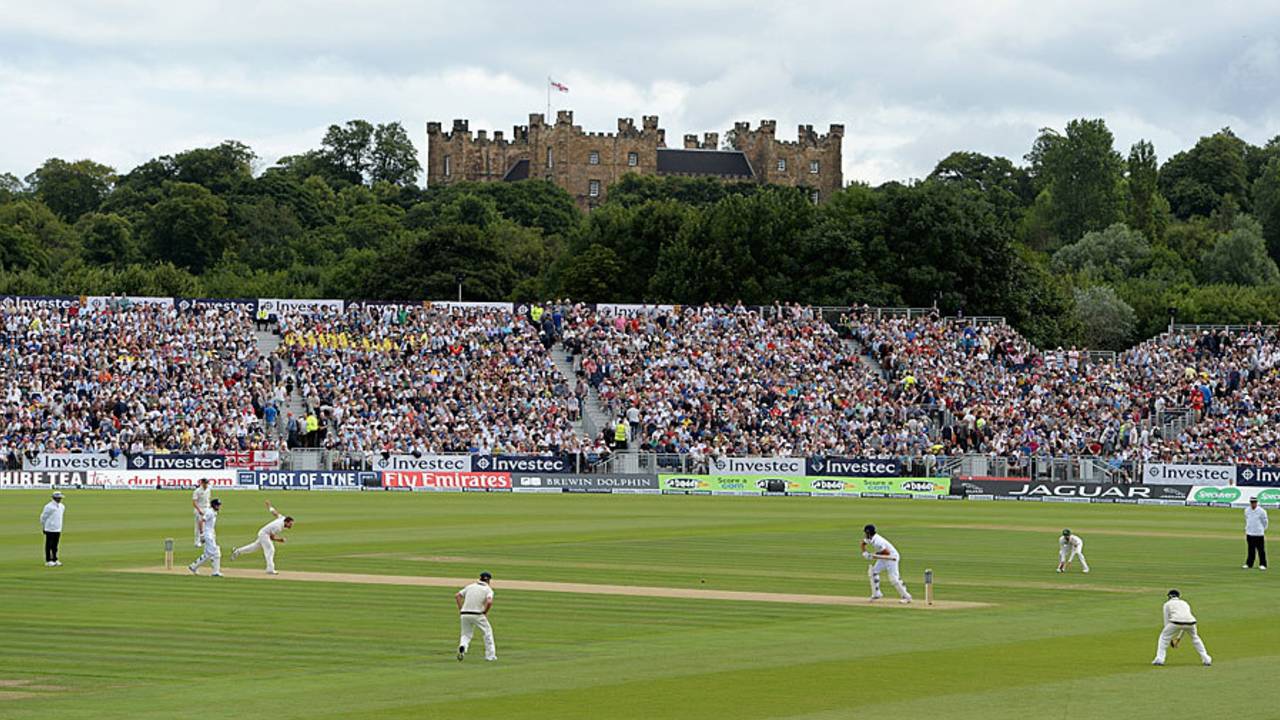Durham claim future secure after admitting ECB bail-out talks
Durham have admitted they are negotiating a financial bale-out from ECB just a fortnight before the Chester-le-Street Test but say their future is not under imminent threat
ESPNcricinfo staff
16-May-2016
Happier times as Chester-le-Street hosts its first Ashes Test • Getty Images
Durham have responded to reports that they are pressing the ECB for a financial injection of more than £1m less than a fortnight before they stage a Test match against Sri Lanka by claiming there is "no imminent threat to the future of the club."
A report in The Times suggested that Durham also want a restructuring of the repayment of their £923,000 staging fee for the second Investec Test against Sri Lanka. Without ECB assistance, the club will need to secure alternative loans to survive.
What the newspaper did not reveal was that Durham considered at one point relinquishing the Test, such were their poor advance sales. They are particularly aggrieved that the first Test is scheduled for Headingley, beginning this Thursday, leaving the two most northerly international grounds to stage successive May Tests - a fact they could not have anticipated when their bid was lodged.
Durham's advance ticket sales are reportedly lower than 30,000 - about 50% lower than Headingley - a further indication that the novelty of international cricket is beginning to pale in Chester-le-Street and that the north's traditional cricketing strongholds in Leeds and Manchester are beginning to punch their weight again after reversing decades of decline.
There is also little comfort to be had from advance sales for the NatWest Blast despite the fact that floodlights installed last season will allow later starts and give time for spectators to attend after work from the north-east conurbations. Durham's advance sales of only 15% of ground capacity are among the lowest in the country, although they will take some hope in the fact that there is less of a culture of buying ahead in the north of the country..
A Durham statement said: "The club confirms that it is in talks with the ECB about the funding of county cricket. Durham and others have been in discussion with the ECB for some time on this subject and continue to have a positive dialogue.
"The Club believes that there is no imminent threat to the future of the Club and as such remains confident in its long-term plans to move towards a sustainable funding model."
Many English counties, particularly the larger international grounds, are under financial pressure after an ECB-encouraged dash for growth a decade ago in an attempt to improve capacities and modernise stadiums.
Although many stadiums have improved beyond measure in the past decade, the English model of reliance on international cricket is slowly weakening, leaving too many grounds chasing too few lucrative fixtures, and making a resolution of prolonged negotiations over the future of Twenty20 in England an urgent necessity.
Campaigners for a shift to Big City Twenty20 - essentially abandoning some of the Shire counties to a second-class existence - look likely to be defeated, leaving the likeliest outcome that the counties will adopt a two-division model influenced by the shift made in club rugby almost a generation ago.
The admission that Durham are in financial straits comes, however, against the backdrop of increasing tension between the ECB and the counties over the share-out of the game's revenue.
The ECB's annual report revealed big increases in central costs - including payments to England players - as well as growing support for the women's and recreational game, but reduced funding for the counties.
ECB reserves are also at record levels of £73m - justified by fears that a Royal funeral could potentially cause heavy losses in a future summer - even though county debts caused primarily by ground expansion are more than twice that figure.
The ECB is reluctant to bail out Durham to such an extent, afraid that others will follow. Northants have also been cap in hand to the Board for financial support.
Measured against that is the fact that the Durham, English cricket's most northerly outpost, has long had a fine record in producing its own players - and from a broader cross-section of society than many.
Durham are already operating without an overseas player - John Hastings, their original, low-cost signing is out for the season after breaking down at IPL - and they have imposed swingeing cuts to their playing budget.
